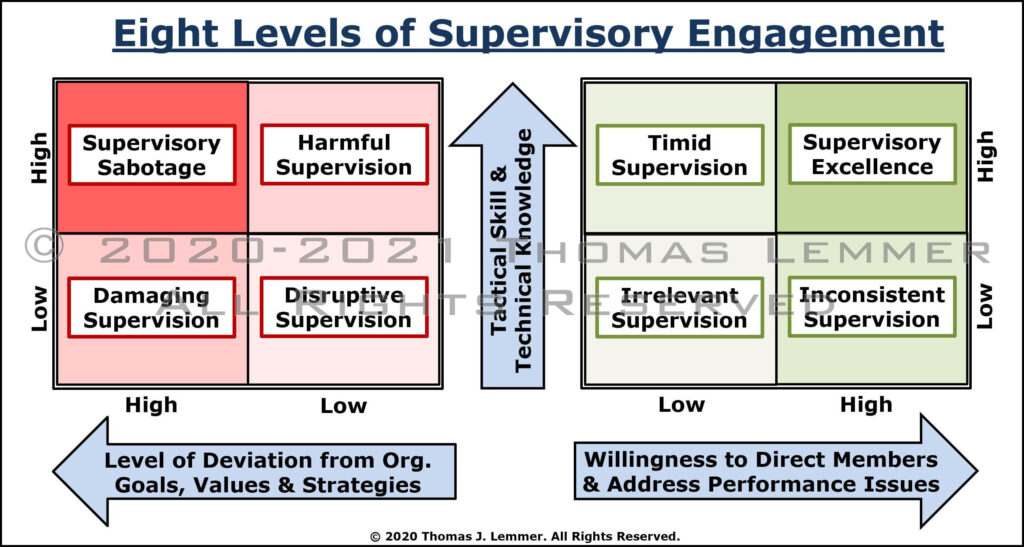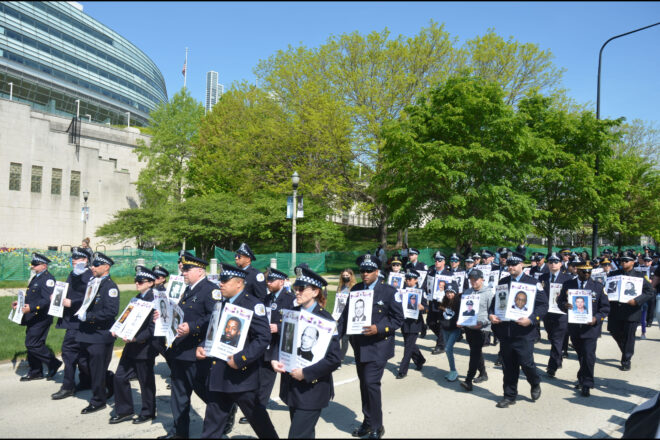Thomas Lemmer developed the below three-factor matrix and identified the “Eight Levels of Supervisory Engagement.” The matrix, engagement levels, and corresponding response strategies draw upon his two decades of experience directing, managing, and assessing law enforcement supervisors and executives. Among Lemmer’s experiences, he led the management accountability efforts of the Chicago Police Department (CPD). In this role, he established the “Three R’s” CompStat Process, assessing readiness, response, and reach capabilities of the department’s various units. Lemmer authored CPD’s first formal directive on the department’s CompStat process, which was approved by Interim CPD Superintendent Charlie Beck in 2020. He also participated in the pre-service training of newly promoted lieutenants, captains, and commanders.
A fundamental truth of organizations, including law enforcement agencies, is that underperforming and problem employees exist. When the underperforming or problem employee is a supervisor, the need for the organization to respond is elevated. This is true even when supervisors are merely ineffective, as ineffective supervisors foster a less effective workforce. However, the impact on the agency is even worse, when supervisors do not support the organization’s values, goals, and strategies. With these supervisors, the need for the organization to respond becomes essential, as such supervisors can crush the organization’s ability to meet its mission. Effectively addressing problematic and deficient supervisors is advanced with an understanding of the Eight Levels of Supervisory Engagement.
The TJL Three-Factor Matrix
All of us have seen a standard two-factor matrix. With the standard matrix, four “high-low” combinations are observable. However, in Lemmer’s experience, the standard matrix did not account for the full range of potential variations among police supervisors. Based upon his observations, he developed a three-factor matrix, which then identifies eight total “high-low” combinations.
The Eight Levels of Supervisory Engagement within policing utilized this three-factor approach. The eight levels identified consider three key variables. First, the level of technical knowledge and tactical skill. Second, the willingness of the supervisor to direct subordinates and proactively address performance issues. Third, whether and the level to which the supervisor has come to reject (deviate) from the organization’s values, goals, and strategies.

Once the eight engagement levels are understood, policing executives can either improve supervisory performance or mitigate the harm being caused. Doing so requires engagement by the managing police executives and the use of 19 response strategies identified by Lemmer.
Learn More – Schedule a Training Session
In follow-up to his supervisory engagement presentation at the Illinois Association of Chiefs of Police (ILACP) 2022 annual conference, Lemmer authored a summary article for the ILACP’s Summer 2022 issue of Command Magazine.
Law enforcement agencies and organizations can also learn more about these engagement levels, and how to successfully implement the 19 corresponding response strategies, by scheduling a training session. One-hour and 90-minute conference session versions, as well as a half-day and full-day seminars are available options. To start the course scheduling process, please complete the information block below. This training has been certified by the Illinois Law Enforcement Training and Standards Board – Executive Institute (ILETSB-EI). The training has also been hosted by the Illinois Chiefs of Police Association and the Illinois Sheriff’s Association.
In collaboration with the ILETSB-EI, Illinois certified law enforcement officers in 2021 were previously able to take a one-hour webinar version of this course via the ILETSB-EI’s Online Learning Network. The state training board has since returned to in-person learning for this course. ILACP members can still receive an 80-minute conference session version of this course in collaboration with the ILESTB. Learn more about the ILACP’s online learning network.
View our brief promo video on the Eight Levels of Supervisory Engagement Model we prepared for the April 2022 ILACP Conference.
Need Assistance? Contact Us Now
To learn more about this course, or to start the scheduling process, please fill out the below form or email us at admin@Secure1776.us.
We can also assist your agency with research, onsite inspections, accountability approaches, policy development, performance assessments, process evaluations, supervisory engagement, and operational planning. Customized training and consulting options are possible to meet the specific needs of your agency.
Contact us now, by completing our contact form or emailing us at admin@secure1776.us.


